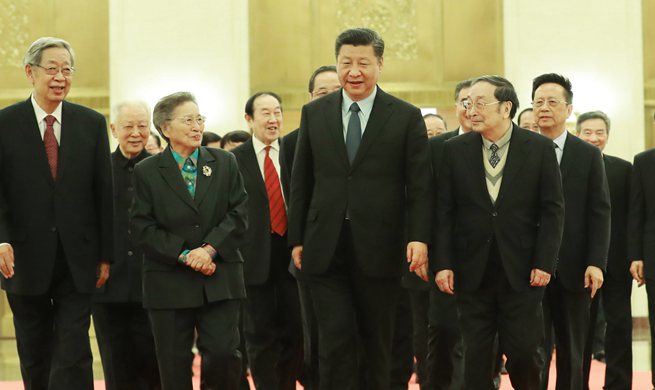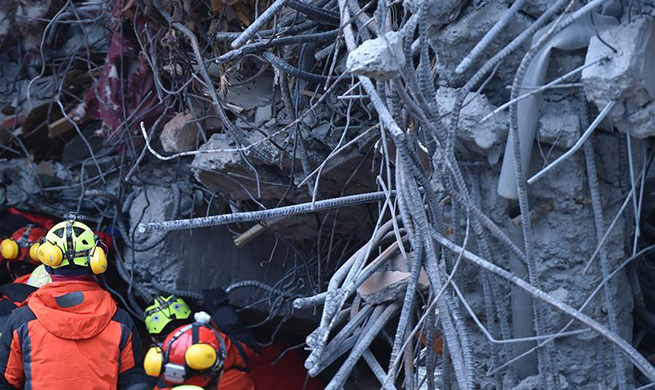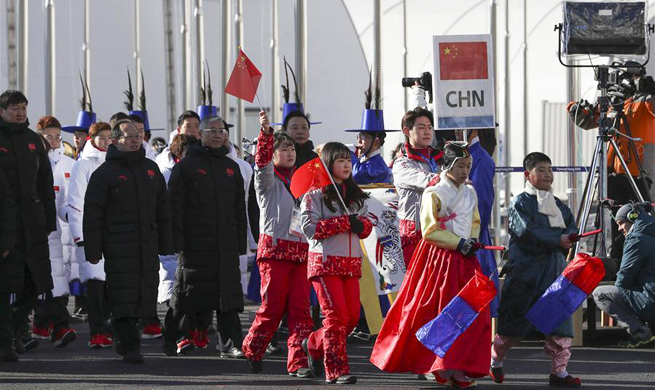by Saud Abu Ramadan
GAZA, Feb. 7 (Xinhua) -- Unemployed Mosab al-Sharif, the 40-year-old father of six, who lives in al-Shatti (Beach) Refugee camp in western Gaza City, complained about his inability to feed his children because of the harder living conditions in the impoverished coastal enclave.
Al-Sharif is merely one of more than two million Palestinians who have been living under a tight Israeli blockade imposed on the Gaza Strip since 2007, when Islamic Hamas movement violently seized control of the enclave.
"I have been unemployed for more than 10 years. I couldn't find a job because getting a job in Gaza is a mission impossible," al-Sharif told Xinhua, ready to go through the entrance to a food distribution center that belongs to the United Nations Relief and Work Agency for Palestinian Refugees in the Near East (UNRWA).
He said he came to the UNRWA food distribution center to get his family's share of food package, which includes rice, cooking oil and sugar.
"I used to get one package of food for each family member every month," said al-Sharif.
But the frequency recently has been lengthened to "every three months."
"If UNRWA shuts down while I have no job, I believe my children will die of starvation," he said with sadness.
The United Nations, which recently launched a global campaign of fundraising to bridge the severe deficit in its annual budget, said UNRWA provides humanitarian aid to some 1.2 million refugees in Gaza, including health, education, food and sanitation.
The tight Israeli security measures imposed on the movement of individuals, including patients, and the goods and product shipments through the crossing points on the border also contribute to the worsening living conditions in the coastal enclave.
Ismail Hothot, a 60-year-old resident of Gaza, who was sitting at a seaside cafe, said he leaves his home early in the morning, sits in the cafe and gets back late in the evening "because I have no cash to give to my wife and children who go to schools and universities."
"The Gaza Strip's population is sinking into a huge ocean, where our legs are tied to a heavy moorage in order not to let us out," said Hothot with anger.
"The situation in Gaza is horrible, and if it is not resolved as soon as possible, the people will explode in the faces of Hamas, Fatah, Abbas and Israel," he added.
On Tuesday, the transport of trucks in the commercial crossing of Kerem Shalom was suspended for one day as a result of a business strike in protest of the decrease in the entry of goods into the enclave, which they attribute to the hardening Israeli blockade.
"There will be more action in the coming days to protest against restrictions on the Palestinian trade movement," said Chamber of Commerce Spokesman Maher Tabaa, adding that the private sector will organize more strikes "if the economic situation keeps deteriorating."
According to the Gaza Goods Coordination Office, the number of freight trucks entering each day has decreased from 800 to between 300 and 400 since the beginning of the year.
Experts say the worsening situation in Gaza is caused by a confluence of more than 10 years of Israeli blockade, the internal Palestinian division between Hamas and President Mahmoud Abbas' Fatah Party, the three large-scale Israeli wars waged on Gaza and the closure of Rafah crossing point with Egypt.
"Within the last few months, economy has been rapidly declining. If the situation is not rescued, the Gaza Strip is going toward a real explosion," Mazen al-Ejlah, an economy professor, expert and analyst from Gaza, told Xinhua.
"I believe stopping international and Arab donations as well as food aid to non-refugees and poor residents of the Gaza Strip has made the situation harder, especially after the World Food Program (WFP) stopped its food aid to Gazan residents, and UNRWA's cuts of aid to the refugees," said al-Ejlah.
In early January, U.S. President Donald Trump announced the withholding of 65 million U.S. dollars out of the total 125 million dollars' grant to the UNRWA.
Washington also suspended its 45-million-dollar food aid pledged to the UNRWA, in order to increase pressure on the Palestinians to resume the stalled peace talks with Israel.

















